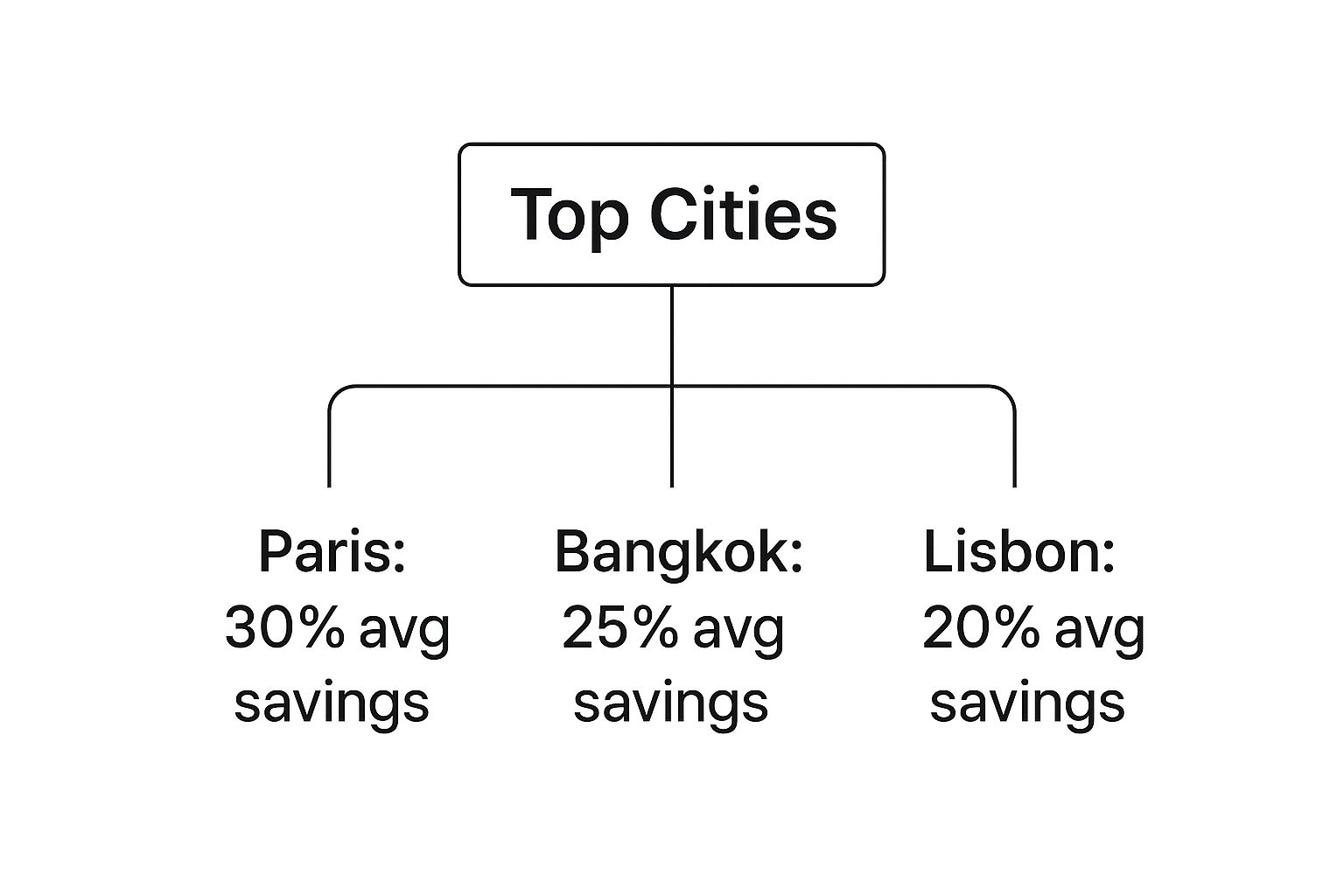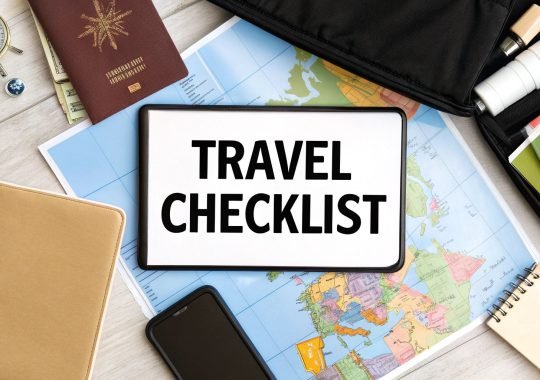So, you want to know the absolute cheapest time to book a hotel? The secret is all about hitting the “booking sweet spot.” For most domestic trips, this window typically opens up about 15 to 30 days before your stay. If you’re heading abroad, you’ll want to look a bit earlier.
This timing is crucial. It helps you dodge the high rates set months in advance and avoid the last-minute price gouge when rooms become scarce.
Finding the Cheapest Time to Book Your Hotel

Ever feel like the price for the exact same hotel room changes every time you refresh the page? You’re not imagining things. Hotels use a strategy called dynamic pricing, where rates constantly adjust based on real-time supply and demand. Think of it like surge pricing for Uber during rush hour—as more people start looking for rooms, the prices climb.
The two biggest forces driving these price shifts are seasonality (the time of year you travel) and lead time (how far in advance you book). Get a handle on how these two factors play together, and you’re well on your way to saving some serious cash.
Your Quick Reference for Optimal Booking
To make it easy, we’ve pinpointed the ideal booking windows for different kinds of trips. These aren’t ironclad rules, but they are reliable guidelines for when prices are most likely to hit their lowest point.
The core idea is simple: don’t book too early when hotels set high initial rates, and don’t book too late when last-minute demand sends prices soaring. The magic happens right in the middle, when hotels get anxious to fill their remaining rooms.
This table gives you a snapshot of when to book. While these are fantastic starting points, keep in mind that every destination has its own rhythm. To really master the game, it helps to understand the fundamentals of how to get the best hotel rates.
Hotel Booking Quick Reference Guide
Ready to find the best deal without all the guesswork? This guide gives you a quick look at the best times to book based on your trip and the season.
Use this summary to quickly find the optimal booking times based on your travel type and the season to secure the lowest prices.
| Travel Type or Season | Optimal Booking Lead Time | Best Day to Book |
|---|---|---|
| Domestic Travel (Off-Peak) | 15-30 days in advance | Sunday |
| Summer Vacation | 3-4 months in advance | Thursday/Friday |
| Holiday & Peak Season | 4-6 months in advance | Sunday |
| International Travel | 45-60 days in advance | Thursday |
| Last-Minute (Risky) | Within 3 days of stay | Monday |
By keeping these windows in mind, you can stop guessing and start booking with a smart, simple strategy. It’s all about turning a game of chance into a predictable way to save.
Decoding the Rhythm of Hotel Pricing

Ever checked a hotel rate, came back the next day, and saw a totally different price? It’s not your imagination. That rollercoaster pricing is a deliberate strategy called dynamic pricing, and once you understand how it works, you can use it to find the cheapest time to book.
Think of it like surge pricing for Uber or Lyft. When demand is low, the fares are standard. But after a big concert lets out, prices jump because everyone needs a ride at the same time. Hotels play the exact same game.
A quiet Tuesday in the middle of February? You’ll probably find a great deal. The week of a major convention or a holiday weekend? Hotels know they’ll be packed, so they raise their rates to match that high demand.
The Brain Behind the Price Changes
This isn’t some manager sitting in a back office manually tweaking rates all day. Hotels use powerful software called Revenue Management Systems (RMS) to do the heavy lifting. This software acts as the digital brain of the hotel, crunching massive amounts of data in real-time.
An RMS is constantly analyzing dozens of factors to set the perfect price at any given moment. Its one and only job is to sell as many rooms as possible for the highest price the market will bear.
So, what kind of data is it looking at?
- Current Occupancy: How full is the hotel for a specific night? As rooms get booked, the price for the ones left gets jacked up. Simple supply and demand.
- Booking Pace: Are rooms for a date three months from now selling faster than they did last year? A sudden rush of bookings signals high demand, and the system will bump up the price.
- Competitor Rates: The RMS is always spying on what nearby hotels are charging. It’s programmed to keep prices competitive but profitable.
- Historical Data: It digs into booking patterns from past years to predict future busy spells, whether it’s an annual festival or just a seasonal rush.
When you start to understand these inputs, you can almost think like the hotel’s pricing algorithm. You begin to see why booking a beach resort for a holiday weekend six months out is so expensive—the system is already predicting a full house.
Turning the System to Your Advantage
Knowing how dynamic pricing works gives you a massive leg up. Instead of just accepting whatever price you’re shown, you can become a strategic deal-hunter. The trick is to book when the revenue management system thinks demand is low.
For instance, if you’re eyeing a trip to a city that’s heavy on business travel, the RMS expects high demand and higher prices from Monday to Thursday. But it also predicts a lull over the weekend. That’s your sweet spot. This is why you can often snag great deals for Friday or Saturday nights in business districts.
It’s also why booking way too far in advance doesn’t always work. A year out, a hotel often doesn’t have enough data to set a smart rate, so they’ll just list a high, generic “rack rate.” The real deals pop up once the RMS has enough booking data to spot the slow periods and starts lowering prices to get more heads in beds.
Ultimately, finding the cheapest time to book a hotel is all about spotting these windows of low demand. Pay attention to the local rhythm of events, seasons, and weekly travel habits, and you can sidestep the price hikes and book when the algorithm is on your side.
The Best Days and Times to Finalize Your Booking

So you’ve wrapped your head around the rhythm of dynamic pricing. Now for the million-dollar question: does the exact day and time you click “book” actually make a difference? Travelers have debated this for years, but the latest data shows that yes, timing your final purchase can absolutely unlock another layer of savings.
The whole theory is built around common booking habits. Most people—especially business travelers—are searching for and booking flights and hotels during the 9-to-5 grind. This creates a predictable surge in search volume from Monday to Friday, and hotel pricing algorithms are smart enough to notice. As demand climbs, so do the rates.
But then the weekend rolls around, and things quiet down. With fewer corporate travelers glued to their screens, the overall search volume tends to dip. This is where you, the savvy leisure traveler, can find a real opening.
The Sunday Booking Strategy
There’s a strong theory that points to Sunday as the best day to find hotel deals. With much lower search traffic, those automated pricing systems may drop rates to tempt weekend browsers and fill rooms before the new week kicks off. It’s a classic case of supply and demand tilting in your favor.
This isn’t just a travel myth; the data backs it up. Hotel room prices show clear patterns based on the day you book, with one window consistently standing out. Research from Expedia shows that booking on a Sunday, especially in the late afternoon or early evening, can lead to some serious discounts. We’re talking average savings of up to 30% compared to booking at other times. This trend is surprisingly consistent across many major hotel brands and booking sites. You can learn more about these booking trends and how they influence prices.
The real secret is to use the weekend lull to your advantage. While everyone else is switching off for the week, you could be locking in a significantly lower rate just by timing your final click.
The Rise of Last-Minute Booking Apps
What if you’re more of a spontaneous traveler, or your plans are always up in the air? For you, the cheapest time to book a hotel might be at the very last second. Last-minute booking apps have become a go-to tool for grabbing incredible deals on rooms that would otherwise sit empty.
These apps work directly with hotels that are desperate to fill unsold rooms for that same night or the next day. A hotel manager would much rather sell a room for 50% off than let it go unsold and make zero revenue. For travelers, this can mean scoring a luxury room for a budget price.
Of course, this approach has its own risks and rewards.
- Pros: You can find massive savings, especially in big cities with tons of hotels. It’s perfect for flexible travelers, road-trippers, or anyone whose plans aren’t set in stone.
- Cons: This is a huge gamble during peak season, holidays, or major events when rooms are likely sold out. You also get very little choice in the hotel or room type, so it’s not a great fit for picky travelers or families with specific needs.
Last-minute booking is a high-risk, high-reward game. It’s a fantastic strategy for solo travelers or couples heading to a major city during a quieter time. It’s a terrible idea if you’re planning a family trip to Disney World during summer break. When you combine this tactic with other strategies, like knowing the best day to book, you build a powerful toolkit for almost any travel scenario.
Mastering the Booking Window for Your Trip
Ask any seasoned traveler their secret to scoring a great hotel deal, and they’ll probably tell you it’s all about timing. The period between when you book your room and when you actually check in—what we call the booking window—is often the biggest factor in how much you pay. Get this right, and you can unlock some serious savings.
Think of it like buying concert tickets. If you buy the day they go on sale, you might pay a premium. If you wait until the last minute, you could face sky-high resale prices from a sold-out show. But somewhere in between, there’s a sweet spot where demand and price find a perfect balance. Hotel booking works the same way.
Booking a year out often means you’re stuck with high, generic rates set before the hotel’s dynamic pricing has kicked in. On the flip side, waiting until the final few days can expose you to surge pricing as rooms disappear and desperation sets in. The real trick is to find that perfect moment in the middle.
The Sweet Spot for Seasonal Travel
That ideal booking window isn’t a one-size-fits-all rule; it changes with the seasons. A summer beach vacation has a totally different rhythm than a cozy fall getaway to the city. To consistently find the best deals, you have to sync your booking strategy with the season of your trip.
This isn’t about guesswork. It’s about understanding predictable patterns so you can plan with confidence. You’re essentially anticipating the market before everyone else does.
Here’s a quick breakdown to help you nail the timing:
- Spring Travel (March-May): Book 3 to 4 months ahead. This gets you in before the spring break crowds start booking, but after the initial placeholder rates have dropped.
- Summer Travel (June-August): Plan to book 4 to 5 months in advance. Summer is prime time, so locking in your room early is key to avoiding peak-season price hikes.
- Fall Travel (September-November): You can afford a shorter window here, usually 2 to 3 months. Demand dips after the summer rush, opening up a wider sweet spot with more flexibility.
- Winter Travel (December-February): For holiday trips, book 5 to 6 months out. If you’re traveling outside of major holidays, 1 to 2 months is often enough.
A study by NerdWallet found that booking about 15 days in advance can land you a room that’s nearly 13% cheaper on average. Just remember, this is a general guideline that works best for off-season travel or less popular spots. For that in-demand summer trip, booking much further out is the way to go.
How Top Destinations Influence Booking Times
Where you’re going matters just as much as when. Some cities are known for offering big rewards to travelers who time their booking just right. This infographic shows just how much you can save in a few popular destinations by mastering the booking window.

As the data shows, getting your timing right for a trip to a city like Paris could cut your hotel bill by up to 30%. It’s a powerful reminder that while general rules are helpful, knowing the unique rhythm of your destination gives you an extra edge.
To make things even easier, here’s a cheat sheet you can use to plan your next trip.
Seasonal Booking Window Cheat Sheet
This table breaks down the best time to book your hotel depending on the season, helping you lock in the best possible rates.
| Travel Season | Optimal Booking Window | Why This Window Works |
|---|---|---|
| Spring (March–May) | 3–4 Months Out | Beats the spring break rush and gives you access to deals before demand peaks. |
| Summer (June–August) | 4–5 Months Out | Secures your spot before peak season prices skyrocket for popular vacation dates. |
| Fall (September–November) | 2–3 Months Out | Takes advantage of the post-summer dip in demand, offering more flexibility and value. |
| Winter (December–February) | 5–6 Months Out | Essential for holiday travel; for non-holiday trips, 1-2 months is often sufficient. |
Think of this as your go-to guide for making smarter booking decisions year-round.
By combining seasonal insights with destination-specific knowledge, you stop being a passive traveler hoping for a good deal and become a savvy deal-hunter who knows how to find one. It’s this two-pronged approach that will help you consistently find the cheapest time to book a hotel, no matter where your adventures take you.
How Seasons and Destinations Shape Your Hotel Bill
While knowing when to click “book” is a huge advantage, it’s only half the battle. The single biggest driver of what you’ll pay is often much simpler: where you’re going and what time of year you choose to go. This isn’t just about timing your booking—it’s about timing your entire trip to hit a destination’s sweet spot.
Think about a classic Colorado ski resort. In January, good luck finding a room. Skiers are everywhere, and prices are through the roof. But fast forward to July, and that same resort is a completely different world. You’ll find quiet hiking trails and rooms available for a fraction of the winter cost. The hotel hasn’t changed, but the seasonal demand has totally flipped its value proposition.
This same logic applies everywhere. A Florida beach town will charge a premium for spring break but becomes an absolute steal in the late fall. Getting a handle on this basic principle of supply and demand is how you find the cheapest time to book hotels, often slashing your accommodation budget by 50% or more.
Learning to Love the Off-Season
Every destination moves through three distinct travel seasons. Understanding how they work is your ticket to massive savings.
- Peak Season: This is when the weather is perfect, schools are out, or a huge event is in town. Demand is at its absolute highest, and so are the rates. Think Paris in June or New York City at Christmastime.
- Shoulder Season: These are the sweet spots just before and after the peak rush. You’ll often find a perfect mix of good weather, smaller crowds, and much friendlier prices.
- Off-Peak Season: Also called the low season, this is when demand hits rock bottom, usually due to so-so weather or fewer activities. For anyone on a tight budget, this is a golden opportunity for deep, deep discounts.
By aiming for the shoulder and off-peak seasons, you get to see a place without fighting the crowds and, more importantly, without paying top dollar.
The real trick is to travel against the current. When everyone is stampeding to the beach in July, think about a city trip instead. When they’re all booking ski trips, look for a cozy coastal town. This counterintuitive move almost always pays off with better deals.
The data backs this up. Traveling off-peak is one of the surest ways to save, with the winter and spring months often offering the best deals across the United States. For instance, in the winter, you can find average nightly rates in cities like Colorado Springs, Colorado, for as low as $98. Columbus, Ohio, comes in around $107, and even a coastal spot like Myrtle Beach, South Carolina, averages about $109. You can dig into more of these seasonal savings opportunities on TravelAwaits.com.
It’s All Local: Destination-Specific Timing
Beyond the big seasonal shifts, every city dances to its own rhythm. Local events, climate quirks, and unique travel patterns all create micro-seasons of high and low demand.
A city that thrives on business travel might have sky-high rates on a Tuesday but offer fantastic deals on the weekend. On the flip side, a leisure magnet like Las Vegas sees its prices shoot up every Friday afternoon.
This is why doing a little homework on your specific destination is so important. A quick search can reveal when the big festivals take place, when local schools are on break, and when the weather tends to chase away the casual tourist. For example, if you’re planning a trip to Music City, you’ll want to know the best time to visit Nashville to avoid both the biggest crowds and the highest prices.
When you combine a smart booking window with destination-specific timing, you’re layering two powerful strategies on top of each other. It’s a proactive approach that ensures you’re not just booking at the right time, but traveling at the right time, too.
Your Action Plan for Finding the Best Hotel Deals
Alright, let’s bring this all together. Finding the cheapest time to book a hotel isn’t about some magic trick or a single “hack.” It’s about building a smart, repeatable strategy that consistently lands you the best rates.
Think of it like building a toolkit. Instead of just having a hammer, you’ll have a whole set of instruments, each designed for a different situation. This approach will always beat relying on one tactic alone.
Create Your Personalized Booking Checklist
Your hunt for the perfect deal should be systematic, not just a random search hoping for the best. When you follow a clear set of steps, you can cover all your bases without feeling overwhelmed. It turns a complicated process into a simple, effective routine.
Here’s a practical sequence I always follow:
- Be Flexible with Your Dates: This is the easiest win. If your schedule allows, use a hotel search engine’s calendar view to spot price differences between days. Just shifting your check-in from a Friday to a Sunday could lead to immediate savings.
- Set Up Price Alerts: Don’t waste your time manually checking prices every day. Use a couple of different platforms to set up alerts for your ideal hotel and dates. Let the technology do the legwork and ping you when prices drop.
- Compare Direct vs. Third-Party: This is a crucial step many people skip. Always check the price on an Online Travel Agency (OTA) and then pop over to the hotel’s own website. Sometimes booking direct comes with perks like free breakfast, a room upgrade, or more flexible cancellation policies that make it a much better value.
The key takeaway here is that a little diligence really does pay off. The traveler who puts in the extra effort to compare options and monitor prices will almost always find a better deal than someone who just books the first rate they see.
Know the Best Day to Finalize Your Purchase
While those big booking windows are vital, the specific day you finally click “buy” can also give you a small but meaningful edge. It turns out the best day to book a hotel often depends on whether you’re traveling within your own country or heading abroad.
A deep dive into booking data shows a slight advantage for certain days. For U.S. domestic travelers, Friday tends to be the cheapest day to book, though the savings are pretty modest at around 2%. International travelers, however, can see a more significant benefit by booking on a Thursday, with savings averaging about 6%. You can explore more of these findings on when to book your hotel at AFAR.com.
Layer Your Strategies for Maximum Impact
No single strategy works in a vacuum. The real power comes from combining them. For instance, you can use your seasonal knowledge to pick a shoulder-season destination, identify the optimal 3-4 month booking window, and then set price alerts to catch a dip on a Thursday or Friday.
When you’re planning for a bigger group trip, understanding strategies for securing group hotel discounts can also slash your costs significantly. This multilayered approach ensures you’re saving money at every possible turn.
To get even more practical advice, check out our guide covering ten tips for securing the best hotel deals. By putting all these pieces together, you’ll have everything you need to find the best hotel rates every single time you travel.
Even with the best game plan, a few questions always seem to pop up when you’re on the hunt for a great hotel deal. Let’s tackle the most common ones head-on, so you can book with total confidence.
Common Questions About Hotel Booking
We’ve put together a quick guide to answer the burning questions every traveler has. From timing your booking to choosing where to click “confirm,” here are the straightforward answers you need.
| Question | Our Take |
|---|---|
| Is it always cheaper to book a hotel last minute? | It’s a high-risk, high-reward game. Sometimes you can snag an incredible deal if a hotel is desperate to fill empty rooms. But this really only works if you’re flexible, heading to a big city with lots of options, and traveling in the off-season. For holidays or popular events? It’s a terrible idea. You’ll likely face sky-high prices or find no rooms at all. |
| Do hotel prices go down after booking? | Yes, they often do! This is why booking a room with a free cancellation policy is your secret weapon. Lock in a rate you’re happy with, then keep an eye on prices. If you spot a drop, you can simply cancel and rebook at the lower price. It gives you peace of mind and the best of both worlds. |
| Should I book directly with the hotel or use a booking site? | There are solid reasons for both, so it’s smart to check each one. Booking sites like Expedia or Booking.com are brilliant for comparing the entire market at a glance. But booking direct often comes with perks like loyalty points, a free breakfast, or even a room upgrade. Always check the hotel’s own website before you commit. |
| How far in advance is too early to book a hotel? | Believe it or not, booking a year out is usually a mistake. Hotels often load their rooms with high, generic “rack rates” that far in advance. Their pricing systems haven’t collected enough demand data yet, so the rates aren’t competitive. The real deals start to emerge inside that 6-month booking window. |
Think of booking as a two-step dance. First, use a comparison site to get a feel for the market rate. Then, head over to the hotel’s own site to see if they can beat that price or sweeten the deal with valuable perks. It’s a simple check that can save you money or score you a better experience.
At HotelsEscape, our mission is to help you find amazing value on every trip. Stay in the loop with our expert reviews, travel news, and exclusive deals at HotelsEscape.




